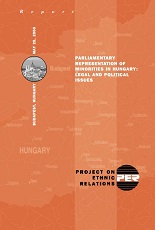Parliamentary Representation of Minorities in Hungary: Legal and Political Issues
Parliamentary Representation of Minorities in Hungary: Legal and Political Issues
Contributor(s): Allen H. Kassof (Editor)
Subject(s): Inter-Ethnic Relations, Ethnic Minorities Studies
Published by: PER Project on Ethnic Relations
Keywords: Romani Minority in Hungary;
Summary/Abstract: Hungary has launched one of Europe’s most comprehensive efforts to address the needs of its ethnic minorities, including unique provisions for self-government. This policy is motivated by the wish to set an example for neighboring countries with large Hungarian minorities, as well as by the need to satisfy the demands of Hungary’s own minorities.
One puzzle that remains unresolved is how to assure ethnically based parliamentary representation at the national level. Except for the large Romani minority, all of Hungary’s twelve other recognized minorities are very small and some are geographically dispersed. (The Greek minority, for example, numbers fewer than 1,000.) Another factor is that Hungary’s 386-member parliament is unicameral, so that the addition of even one mandatory place for each of the thirteen recognized minorities could have unpredictable effects on the balance of power in governments that typically are made up of coalitions. There is also the question of how to balance the expectations of a large minority, the Roma, with those of the small minorities.
Series: PER Reports
- Page Count: 16
- Publication Year: 2000
- Language: English
- Content File-PDF

